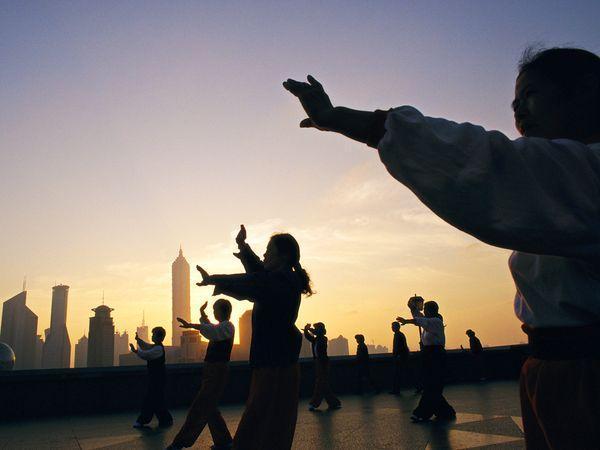Tai Chi and Ailing Joints
Tai Chi and Ailing Joints
Tai chi produces the same benefits as physical therapy for patients suffering from knee osteoarthritis, according to a new study by researchers at the Tufts School of Medicine.
The study, led by Chenchen Wang, a professor at the School of Medicine, focused on osteoarthritis patients who reported significant pain. The average participant was 60 years old, and many were obese. “This was a really representative sample of patients we see in our clinical practice at Tufts Medical Center every day,” says Wang, director of the Center for Complementary and Integrative Medicine at Tufts Medical Center.
Wang defines tai chi in her studies as a multi-component traditional Chinese mind-body practice that combines meditation with slow, gentle, graceful movements, deep diaphragmatic breathing, and relaxation.
Patients were randomly assigned to either do tai chi twice a week for 12 weeks with an instructor with 10 to 30 years of experience, or undergo physical therapy twice a week at Tufts Medical Center for six weeks and then do six weeks of exercise at home. At the end of the 12 weeks, the tai chi and physical therapy groups reported equal improvement in pain and related health outcomes, effects that remained 52 weeks after the start of the study.
“Six weeks is very expensive with a physical therapist,” says Wang, who is a member of the National Advisory Council for Complementary and Integrative Health
at the National Institutes of Health. By comparison, “tai chi is relatively cheap, and you can get it in a lot of places,” she notes.
The effects were the same across the four tai chi instructors, she adds, showing the protocol is easy to learn and perform successfully. “Everyone can do this,” she says.
Further, the tai chi group showed significantly more improvement than the physical therapy group when it came to depression and quality of life. “By integrating physical, psychosocial, emotional, spiritual and behavioral elements, tai chi may systematically promote health by its effect on both the body and the mind,” according to the study, which was published online May 17 in advance of print publication in the Annals of Internal Medicine.
“These people never knew what tai chi was. But when we brought them to the tai chi room at Tufts Medical Center week by week, we saw them changing to become happier, healthier people,” says Wang, who watched patients’ progress on video. “It was very exciting to see every day.”
The study conclusion: “Standardized tai chi should be considered as an effective therapeutic option for knee osteoarthritis.”
Rise of Integrated Medicine
Times have certainly changed since Wang conducted her first study in 2008 at Tufts showing that tai chi alleviates pain in knee osteoarthritis patients. For that research, the 40 patients and single instructor practiced the ancient Chinese martial art in a conference room. “When there were meetings, patients would stand outside and wait,” says Wang.
Her most recent study was a different story. It included 204 patients and four instructors, the largest group in any tai chi study, and they practiced in a dedicated tai chi room.
Wang has seen a greater accommodation in the medical world’s attitude toward tai chi as well. “After 10 to 20 years doing this work, I think integrated medicine is becoming popular now,” Wang says. “Everyone realizes its importance.”
Now Wang is planning on studying the mechanism by which tai chi produces its benefits. She has been conducting brain imaging studies to more closely examine the biological psychology and social aspects of the treatment, and also will estimate the net health-care spending reduction of offering tai chi as an alternative to physical therapy.
Tai chi could benefit more than just osteoarthritis patients, says Wang. She has also found that it promotes cardiovascular fitness and reduces pain associated with fibromyalgia.
“When I came to North America and I saw people use pain medication, I was so surprised. I asked, ‘Why would you use something like this?’” says Wang, who grew up watching her mother, a Chinese physician, rely on traditional Chinese medicine and acupuncture, combined with Western medicine.
“This is the main reason I became a physician and scientist, and I think more young people and health-care professionals should realize the importance of this field,” she says. “Complementary and integrated medicine is a big field now—whatever patients need, this provides the best care.”
by Monica Jimenez For Tufts Now
Be the first to post a message!
